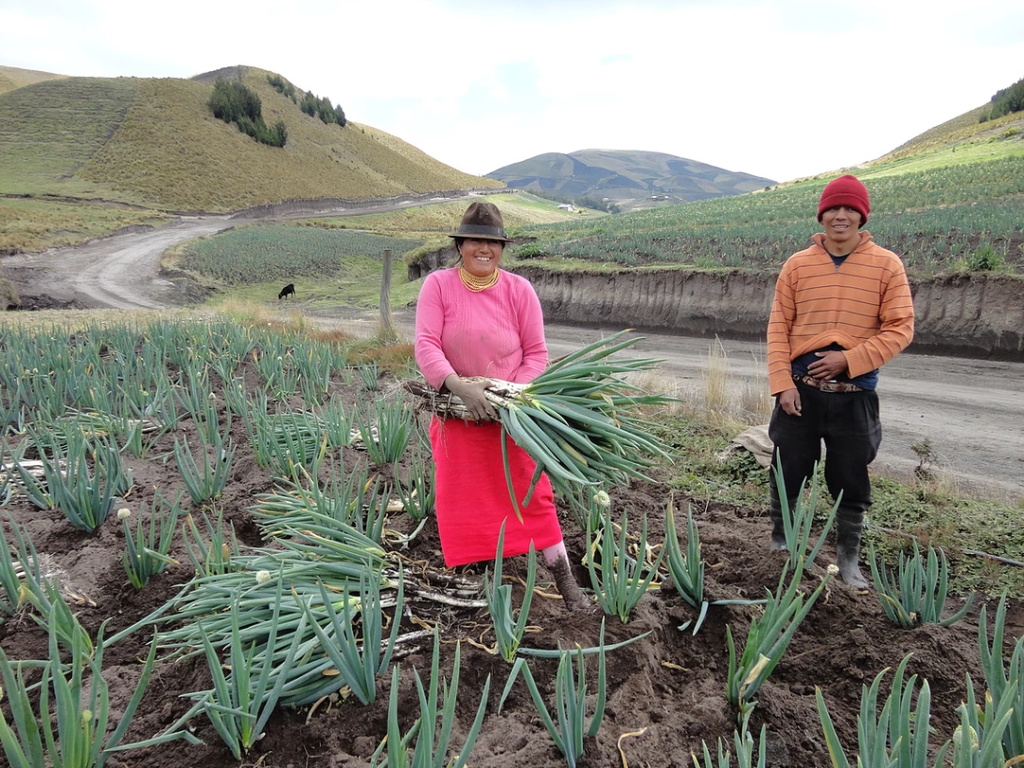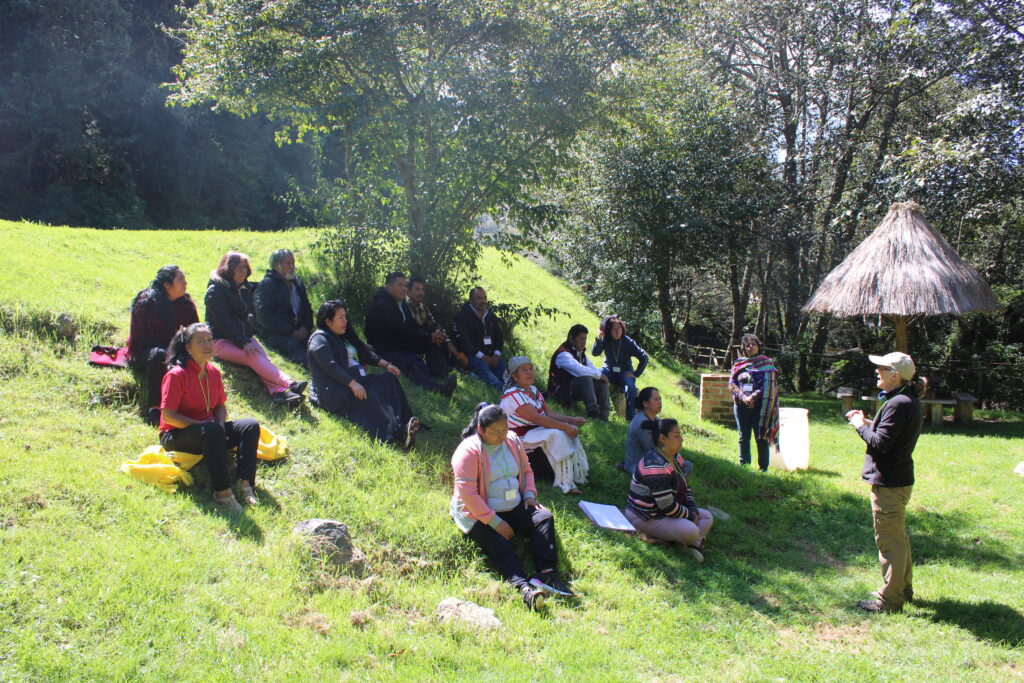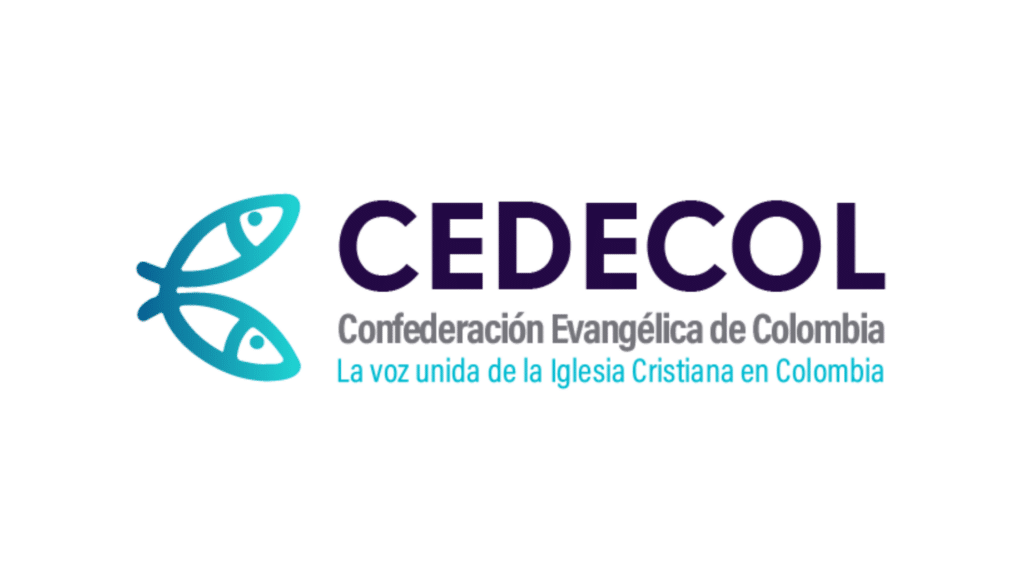FEDICE Priority Projects
Ecuador
Read the latest update from FEDICE
The Ecumenical Foundation for Integral Development, Training and Education (FEDICE) coordinates educational, health, agriculture, and community development projects with the indigenous population in rural communities of Ecuador, a country where between 70 and 80 percent of the population lives in poverty. With the help of Global Ministries and other partners, FEDICE carries out income-generation and construction projects, medical clinics, pastoral work, and other programs in the provinces of Imbabura and Cotopaxi. FEDICE also has been instrumental in the development of water systems and agricultural and animal husbandry programs (mostly led by indigenous women), including cultivation of garlic and onions, and raising sheep, guinea pigs, rabbits, chickens, and cows.
FEDICE’s projects are for families but are especially geared to being led by women. All family members share the activities and responsibilities for taking care of the animals and development of the projects. The projects include:
- In Cochapamba, FEDICE has been working with women since 2007. At this time, there are 50 women in the project and they have carried out five projects. After six years of work, the organization has been able to develop its own internal fund of $5,000 as a result of providing micro-credit loans within the organization and community. Cochapamba has projects currently running to increase production of white onions, sheep, and cows.
- In El Chaupi Contadero, FEDICE began working with the people in this area in 2006, raising cattle in order to produce milk to sell. At this time, the group has 36 families, many of them led by women, who now have small herds of milk cows thanks to the five projects over six years. The organization that was formed with the help of FEDICE now has a fund of its own of $11,000 as a result of the interest generated from internal loans within the community. The group also has complied responsibly and honestly in the re-payment of the loans, which has motivated FEDICE to continue to support them.
- In Santa Rosa, the group has been working with FEDICE since 2007. In their latest project, each family received a loan of $400. The work has developed a climate of confidence between the group and FEDICE and, little by little, they have been able to progress. The loans have permitted them not only to better the level and quality of life of the associates, but have also helped them to dream of a better future for the families within the group of 22 families which are working with FEDICE.
- In the community of San Francisco, the Association “Constructing the Future” is formed of 25 women who principally work in chicken projects and live in the community. FEDICE began its support of the Association in the year 2000 by means of a chicken project, using the application of techniques adequate to the production process, and taking advantage of the natural resources and the labor available in this community. One of the most important results of the organization has been the generation of savings in a collective form by creating a common fund. At this time, the organization has a fund of $15,000.
- In Luz de America, FEDICE started working with a group in September of 2007 with a breeding project of animals and fowl. From that small start, the group has worked responsibly, participating actively in the training sessions, re-paying their loans on time, and above all generating a savings plan. At this time, the group has a savings of $5,000, the product of internal loans.
- In Maca Atapulo, the group has 25 people, (24 women and 1 man). They began their activities with FEDICE in 2009 with a project to improve the genetics of the sheep they were raising. They were interested in the training that they would receive and promised to attend the sessions and to complete the family projects. In the latest project, each family received a loan of $400. The group at the moment has vast experience with the technical management of cattle and sheep. In relation to the organizational component, the group has become stronger.
- In Jatun Juigua, the group has been working with FEDICE since 2009 with a group of 40 receiving a loan of $8,000 for their first project, which was for cattle production. At the present time there are 39 women in the group, and they have executed three projects. After three years of work, the organization has its own fund of $500, which they use for giving internal loans within the group. In the latest project, each family received a loan for $400, partially subsidized by FEDICE. The group at this time has lots of experience in the technical management of both cattle and sheep as a result of the training they have received during the development of the projects.
- In Pupaná Sur, the group of 20 women has been able to remain united, working responsibly, and for this reason they are an example for other groups in the social aspect, and this has permitted FEDICE to continue working with them on various projects. During the execution of all the projects, these women have continued to receive training in areas such as the sanitary management of animals and how to obtain organic fertilizer using earthworms to better the quality of the soil and obtain better crops. They continue to raise cattle, pigs, guinea pigs and rabbits.
In all of these cases, FEDICE provides ongoing technical training and educational support, working with community groups to move forward in the development of their families and broader communities. FEDICE works with them as they implement new strategies for ongoing projects and provides special support, both financial and professional, for new initiatives. FEDICE incorporates new communities in such work as they are able.
FEDICE also is involved in the establishment of child care centers. In the community of Romerillos, FEDICE has been helping in the construction of the Infant Center as well as donating medicines, kitchen utensils, clothing, toys and playground equipment. They plan to plant a crop of white onions and a community garden for the center. Because of the situation of low income, the families have to go outside to work, leaving their children in the Infant Center, where they are taken care of; they have food, and learning opportunities.
The raising of animals is a fundamental part of the farm economy of the community of Romerillos. They possess cross-bred animals, which they raise in small spaces. They have a certain amount of knowledge about technical management, but sometimes there is high mortality of the animals due to sickness. The animals are used for their own consumption and to sell. The group has been working with FEDICE since 2011, with the group of 20 women.
The Child Day Care Centers are: Caluqui Day Care Center named for Violet Groth Vaca, San Francisco Day Care Center named for Victor Hugo Vaca, founders of FEDICE. The Romerillos Day Care Center named for Lisa Franke. All of these Day Care Centers provide food and learning opportunities that they might not otherwise have.
Update: Christmas 2013
“Everything that happens in this world happens at the time God chooses.” Ecclesiastes 3:1
Dear Friends,
From all of us at FEDICE, we wish you and yours a very meaningful Christmas and a prosperous New Year.
This was a year of changes that brought a variety of new situations for us. In February, our co-founder and executive director of FEDICE, Victor Hugo Vaca, passed away. Victor left a big hole in our hearts, but our firm decision was to continue on with the vision that he and his wife, Violet Groth Vaca, had….”helping the indigenous and farming rural communities find equality and better their conditions of life in the country.”
The executive committee of FEDICE appointed Blanca Puma Martinez as Executive Director in Victor´s place. Blanca went to the United States in April, and was able to visit with many of our good friends and co-laborers in Oregon, Texas, Illinois and Minnesota. Blanca also visited the office of Global Ministries in Indianapolis. Thanks to God, she received much backing from our brothers and sisters in the USA. The principle message we received was, “Blanca, you are not alone. FEDICE is not alone.” Thanks to God for all the people who have kept faith in our work and keep supporting the labor of FEDICE”
In March, FEDICE began working with Bridging Cultures ( BC ), a non-profit organization in Texas which is helping the community of Pusir located north of the province of Imbabura. In May and August, two groups of volunteers from BC came to work in Pusir while FEDICE provided “on the ground” help in organization for their work, and in addition, FEDICE began the process to initiate a productive project with a group of women in Pusir. The group of women, with the help and support and continuous follow-up of the technicians of FEDICE, has up to now done a good job.
The 3rd of August was the inauguration of the new building of the Children´s Center of San Francisco, which was started by the group from Plano, Texas, and helped by other groups from Fort Worth, Texas, and Illinois. This pre-school center will have the name of “Our Little Angels of Victor Vaca” in honor of our deceased director, who helped so much in this area and with the poor people of the communities.
In August, a group from Plano, Texas, arrived to work in Pijal, in the province of Imbabura. This group brought doctors, nurses, ophthalmologists, a construction group, and a team for Christian Education. Thanks to a donation from the father of one of the group, the community was able to start a “special” project constructing a house for Cecilia Fonte, a single mother with some health problems and a member of the community. Her family had given her a little space to live in with her four children under a staircase in her cousin´s house, but the space was terribly inadequate. Now the people of Pijal are constructing a little house for her, with two rooms and a kitchen. FEDICE has helped with organizing and the community of Pijal has responded in an extraordinary manner with community workdays (Mingas) in order to give Cecilia a respectable place to live. Nevertheless, there are still some things lacking in order to make this dream a reality.
One of the fundamental changes begun by the FEDICE team this year was the Long Range Plan for 2013 through 2018”. FEDICE maintains its philosophy of helping the poor communities, and therefore has started this process based on five main focuses: technological, psychological-social, administrative, legal and economic-productive. With these focuses, we look to better the conditions of life for the people in the communities by invigorating the local economy and fortifying their social structures.
These are only some of the projects in which FEDICE has worked this year. In 2013 we have also helped 11 communities with various income producing projects in communities such as: Pijal, Pusir, Pupana, Santa Rosa, El Chaupi, Luz de America, Romerillos, San Francisco, Cochapamba, Jatun Juigua, and Maca Atapulo by offering technical training, organizational orientation, as well as reimbursable funds for the development of projects.
At this time, FEDICE is also supporting four Infant Centers: “Little Sprouts of Violeta Groth Vaca” in Caluquí, “My Little Angels of Victor Hugo Vaca” in San Francisco, “Sweet Angels of Lisa Franke” in Romerillos, and “Sumak Wasi” (Good Home) in the community of Pijal.
In April 2013, Glenn Hebert, one of our volunteers, finished the design of our FEDICE Website, and we are very proud of Glenn´s work, which in spite of his disability, has been able to painstakingly help us and be such an example of an overcoming spirit for the rest of us. In the same way, Marilyn, his wife, has continued with her English classes in the Children´s Centers.
In addition, this year we have been visited by Alee Sable from Fort Worth and Isabelle Tyrasa from Germany.
Alee came to find out more about the work of FEDICE and to help with activities in the Children´s Centers. In the same way, we still count on the presence and support of our other volunteers, Lisa Renz, Isabelle Tyrasa (Germany), Glenn Hebert, Marilyn Cooper, and Luis Jara. We thank them all for their part in the work of FEDICE.
Next year, we look forward to visits from various people and groups from the USA. The technical, administrative, and operational FEDICE team, the Executive Committee, and the people from the communities all give thanks to God for all the activities carried out during this year, and we put in God´s hands all the unfilled requests and the planning for the future. We are completely confident in our Lord Jesus Christ, our Creator, and we are equally confident that we can count on your support.
For more information, go to our Website: www.fedice.org. Also visit our blog where we are constantly putting up news about our work.
With Christmas Greetings from,
The FEDICE team
Update May 2015
The women’s group in the community of El Chaupi Contadero continues working collectively on their project in production of dairy cattle, through which they seek to improve the living conditions of all the inhabitants of El Chaupi. In 2014 the group welcomed two new members to the program; such expansion increases the chances of success of the project. The production of dairy cattle has increased by 188 percent in 2014 as compared with 2013. Before this program began the women had cows that produced two gallons of milk per day; today the families have cows producing four gallons of milk per day. Much of this success is a result of the cooperation and advice of FEDICE.
The members of the women’s group also have developed a culture of saving through their work with FEDICE. To date, the group’s total savings is $2,433.10 with each member having saved $62.00, which will go toward the education of their children in most cases. The women’s organization reported total capital of $18,941.40 in November 2014 that is being implemented in the cattle project and in the savings program.
The main challenge facing FEDICE is the distance to the El Chaupi Contadero community. The travel of the technical team from Quito takes on average four hours. Moreoever, since the group is mainly composed of older women, it is necessary for FEDICE staff to use only common, familiar vocabulary and graphics for the trainings in order for the women to assimilate the knowledge more easily.
For 2015 year, the project will incorporate a new, small office for the organization. The aim of this is to improve the record-keeping of the economic resources of the organization and the member savings deposited. Training in management and accounting will be conducted by FEDICE staff with the women to learn to manage the funds accurately for the organization.
 In the village of Santa Rosa, 27 women participate in the production of pigs, dairy cattle, and chickens. The goal of this program is the empowerment of women by raising livestock. The women receive training so they are able to manage their families’ resources on their own. To date the members have saved $6,673.65. This money is used as a working capital for new loans to women in the organization. The program reported that milk production per cow increased by 33 percent in 2014 to approximately two to three gallons of milk per day per cow, with genetically improved types of cows producing four gallons per day. Production costs for the pigs and chickens are lower than for the cows, allowing a greater profit margin for the families involved in raising those animals.
In the village of Santa Rosa, 27 women participate in the production of pigs, dairy cattle, and chickens. The goal of this program is the empowerment of women by raising livestock. The women receive training so they are able to manage their families’ resources on their own. To date the members have saved $6,673.65. This money is used as a working capital for new loans to women in the organization. The program reported that milk production per cow increased by 33 percent in 2014 to approximately two to three gallons of milk per day per cow, with genetically improved types of cows producing four gallons per day. Production costs for the pigs and chickens are lower than for the cows, allowing a greater profit margin for the families involved in raising those animals.
The projects in Santa Rosa are designed for women over 18 years of age; most of the women in the organization are either young adult or older women, who in many cases are not literate. For this reason FEDICE trainings seek to use graphics and practical demonstrations so that the knowledge can be assimilated more easily by these women.
In 2015 the Santa Rosa organization is beginning to streamline their accounting practices, with FEDICE providing a grant to them to cover approximately 70% of the cost of these improvements a non-reimbursable grant. The organization hopes to purchase a computer, a filing cabinet, and a desk with some of the funds. The remaining needs to improve their bookkeeping system and practice will be financed by the organization in Santa Rosa. The resources will be invested in the purchase of chairs, a blackboard, and office supplies. The purpose of this project is to increase the productivity of administrative management by the application of a strategy consisting of three elements: technology, knowledge, and investment.
This project seeks to meet three objectives:
- Encourage savings.
- Encourage local production.
- Improve the participation of women in the productive life of the community.
Improved sheep production is the project in the community of Maca Atapulo. The improved sheep will produce more wool and meat. In the past the people of the community raised creole sheep producing between four to five pounds of wool with a market price of these animals being from $25 to $50 dollars. With the implementation of the improved sheep program, eight to ten pounds of wool per shearing is produced with the market price of each animal being $80 to $120 per animal.
Solidarity among the women of Maca Atapulo has resulted in their organization have an operating capital of $5000. These resources are used to meet the needs of the organization including financing for the members by providing loans with interest rates and terms tailored to the individual needs of the people. The major challenge to this program is communicating during training sessions since 20 percent participants speak Spanish and 80 percent speak only Quichua. In the coming year, increased monitoring of the animals will be undertaken by the community with help from FEDICE with the hope of continuing to increase the market price of the animals.
Resources to implement this project come from two sources. FEDICE furnishes 63 percent of the total cost with the Maca Atapulo organization finances the remaining 37 percent.
Emma’s Story
Emma from the Contadero Chaupi community reports:
My work is caring for animals and working in agriculture at which I am successful. Since I started working with FEDICE my life has taken a different turn. We meet each month with Marco Garzon, the FEDICE technician who shares his knowledge on animal husbandry. We also have times of prayer and reflection on the word of God that makes us grow in love for God and for neighbor.
In our local organization, which is supported by FEDICE, I am the treasurer and pay the bills. We settle accounts every four months and also make new loans to group members. The income that members generate through their projects, helps us to cope with expenses related to our children attending school and with the provision of food for the families. Loans are then paid back to the organization and new loans are made. We also save for the future as a group.
Being in the group has helped me to be more connected to my community and its members. We as a group also support our colleagues when they have health problems or lose a family member.
Finally, I thank God who has given us this foundation for the future and pray for the life of all those working in FEDICE and the people of the churches in the United States who have visited us and supported us. I hope we continue to support all of us women, who struggle and who are very hard workers.
Gina’s Story
 Gina is a fighter, a dreamer, and a very brave woman. She kept to her dreams and goals: to work for her children. Today Gina has a degree in Accounting and Auditing. She also has a knack for elaborating handmade crafts. Gina reports that her participation for eight years in the Santa Rosa group in her community supports her mind, knowledge, and her relationship with her fellow group members. In relation to her work with FEDICE, Gina says: I want to thank FEDICE infinitely for your support. Thank you for the trust, friendship, and commitment they put into the projects undertaken. Thanks because we know that their hard work is not in vain. Each of the projects benefited the participating families in one way or another. Through our work with FEDICE, we have improved and realized that we are not alone. May God reward you and blessings to all, concludes Gina.
Gina is a fighter, a dreamer, and a very brave woman. She kept to her dreams and goals: to work for her children. Today Gina has a degree in Accounting and Auditing. She also has a knack for elaborating handmade crafts. Gina reports that her participation for eight years in the Santa Rosa group in her community supports her mind, knowledge, and her relationship with her fellow group members. In relation to her work with FEDICE, Gina says: I want to thank FEDICE infinitely for your support. Thank you for the trust, friendship, and commitment they put into the projects undertaken. Thanks because we know that their hard work is not in vain. Each of the projects benefited the participating families in one way or another. Through our work with FEDICE, we have improved and realized that we are not alone. May God reward you and blessings to all, concludes Gina.
Carmen’s Story
Carmen, the President of the women’s organization of Maca Atapulo shares:
With the work and support of FEDICE I can raise my children. The women we work with from FEDICE for the past six years have helped us all with technical education and economic support. We know about handling sheep, chickens, guinea pigs, cows, and pigs. With FEDICE we have learned to be organized.
Read a donor story supporting the work of FEDICE.
Update March 2016
This is a story about hard work paying off. In 2013, the community of Romerillos set out to expand their child care center — a critical resource for working parents — to accommodate the growing number of children under five years of age. Many stakeholders, including the parent’s association, the child care center staff, a secondary school in the U.S. and a regional conference of churches, came together to make this goal a reality. Hear from community members how completing this project has not only given them sufficient space for early childhood education and care, but how it has changed their outlook when it comes to the challenges they face as an indigenous village in rural Ecuador.
Update April 2016: Earthquake Response
On Sunday, April 17, 2016, Ecuador was hit by a magnitude 7.8 earthquake, sparking fears of a possible tsunami and causing widespread damage. The earthquake was approximately 12 miles deep and centered approximately 17 miles south-southeast of Muisne, in a tourist area of fishing ports. As of Tuesday, April 19, 2016, over 400 deaths had been reported and more than 2,000 were injured. Traumatized survivors are evaluating their next steps amid the rubble of their former homes, as rescue responders continue to search for survivors in the Andean nation’s shattered coastal region. Physical damages reported so far include demolished buildings, broken roadways, and lost electricity along the Pacific coastline. The Ecuadoran President, Rafael Correa has indicated that reconstruction will cost billions of dollars.
In the northern parts of Ecuador, along the beach town of Pedernales, survivors have been seen curled up on mattresses or in plastic chairs next to their flattened homes. Relief responders are using the still-standing stadium in the town of Pedernales to provide medical attention to the injured and to distribute water, food, and blankets to those who have lost homes.
The Ecumenical Foundation for Integral Development, Training, and Education (FEDICE), long-standing Global Ministries partner in Ecuador, is responding to the disaster by providing food, water, blankets, clothes and first aid provisions to the affected communities. Global Ministries is accompanying FEDICE in response to the communities most devastated by the earthquake in Ecuador.
To learn about the overall denominational response to the earthquake in Ecuador, Global Ministries encourages you to go to Week of Compassion’s (Disciple) response and One Great Hour of Sharing’s (UCC) response to this disaster.
Update April 2016: Earthquake update from FEDICE
Another week begins, and it has been 9 long days since the earthquake in our dear country. Perhaps for us, who are in another zone, it is just another week, but not for our brothers and sisters in the zones affected by the 7.8 earthquake on the Richter scale.
Today I write with tears in my eyes, and in spite of my heart upon seeing the devastation, the mortality keeps rising: 655 dead, 48 missing, 17,638 injured or treated for health reasons, 29,067 in shelters, 113 rescued alive, 281 schools damaged, according the report given by the Secretariat of Risks.
The needs are dire, but to see the solidarity, the unity, the support for all those affected provoke a sentiment that makes tears of gratitude to well up in our eyes in the midst of the devastation.
Thanks to all who are collaborating and who are planning on doing so. The FEDICE team will keep on working, praying for them, and planning the best ways of helping them right now and in the long range.
Blessings,
The FEDICE team
Update May 2016: Earthquake update from FEDICE
 According to the Secretary of Risk Management, there have been 663 deaths reported, 9 missing persons, 6,274 injured, 28,775 individuals in shelters, and 113 have been rescued alive. As the aftershocks continue to disrupt communities in Ecuador, the government has delivered 737,787 food kits in the past month.
According to the Secretary of Risk Management, there have been 663 deaths reported, 9 missing persons, 6,274 injured, 28,775 individuals in shelters, and 113 have been rescued alive. As the aftershocks continue to disrupt communities in Ecuador, the government has delivered 737,787 food kits in the past month.
Since the April 16th earthquake, 1,504 aftershocks have been registered, the strongest being a magnitude of 6.8 on May 18, which led to one death, 67 injured, 27 homes damaged, and a loss of electricity in the Provinces of Esmeraldas, Los Ríos and Pichincha. The city, Los Bancos in the province of Pichincha was also damaged by the continuing aftershocks and has been declared an emergency zone after the collapse of several homes.
On May 14, FEDICE delivered 100 personal hygiene kits in the area of El Carmen, Manabi, with the help of a group from the Evangelical United Methodist Church of Ecuador.
FEDICE’s technicians are preparing an economic reactivation project for some of the families located in the affected zones.
FEDICE comments, “‘…Torn down but not destroyed (2 Corinthians 4:9).’ We are united in our efforts to stand up again with might and to overcome the adversities which are happening in our country at this time.”
Update August 2016
FEDICE carries out sustainable community and social development projects throughout Ecuador. These can take many forms and shapes to meet the diverse needs of the community, such as income-generation projects, construction, medical clinics, pastoral work, and other programs. FEDICE provides ongoing technical training and educational support, working with community groups to empower them towards self-sufficiency and sustainability. South Pupana and Romerillos are two communities that display how FEDICE works with communities to provide income-generating projects and trainings in agriculture. FEDICE has recently shared updates from these two communities of their long-term development work.
South Pupana
The FEDICE project in South Pupana continues to strengthen its existing initiatives through technical training and microcredit to families, with a particular emphasis on agricultural business practices and resources. Between February 2015 and February 2016, families that have been participating in FEDICE’s trainings and agricultural initiatives have been their income as a result of their growing expertise and growing farms. In addition, FEDICE is beginning to add trainings for families to increase their milk production in the next year. Another new training offered in South Pupana is providing families to begin raising piglets for sale. In addition to agricultural efforts, the community is embarking on running equipment rentals, as well as preparing and selling clothes. Through these efforts, FEDICE has been able to reduce unemployment and in South Pupana, and a supportive community has developed between participating families.
In South Pupana, occasional opportunities for temporary income become available throughout the year, and sometimes conflict with the training classes of FEDICE. In order to allow participants to work these temporary positions, receive additional incomes, and still attend trainings, FEDICE is exploring new training schedules.
Rosa’s Story from South Pupana
“I now have my animals, which I bought with FEDICE credits, and learned how to handle and care for themthrough FEDICE trainings. FEDICE also helped me with a loan to buy an industrial mixer to prepare espumilla (an Ecuadorian dessert), since my back was beginning to ache from mixing the espumilla by hand for 20 years. I thank our trainer and his wife, for sharing reflections on the Bible that teaches us to be honest and hardworking women.”
Romerillos
FEDICE began working with the community of Romerillos in 2012, when 20 mothers, who had children in the Romerillos Children Center, indicated their interest in FEDICE trainings and agricultural projects. Between 2012 and 2016, families in Romerillos have focused on the production and sale of onions, pigs, sheep and cows, through FEDICE initiatives. Last year, the community contributed the majority of the funds for microcredit loans, with FEDICE providing a portion of the funds for new loans. This has been one of the primary impacts of the trainings and agricultural projects in Romerillos, that the community has been able to build their own fund over four years of work, and can provide new loans through the income generated.
Training is a fundamental pillar of FEDICE projects. Families are trained in organizational management, production management, developing their skills and vision, and achieving goals and objectives of the project. In the production of onions, technical training enabled the community to increase its areas of production by over 50%, with big increases in the amount these farms harvest – instead of producing 59 bunches per month, families in Romerillos now produce 189 bunches per month. Through trainings on cattle breeding practices, the community doubled their milk production. FEDICE continues to provide specialized trainings in agricultural and community development projects in South Pupana, Romerillos, and many other rural communities in Ecuador.
Update August 2016: Earthquake update from FEDICE
The area of Sua–Esmeraldas is known for its tourism and fishing industry, both heavily impacted by the recent disasters. Many tourists are scared to travel to this region after hearing the international headlines about the earthquake, and therefore causing a drastic decrease in tourism. An unexpected consequence of the earthquake was that many of fish have moved to deeper, more stable waters after the earthquake disrupted their natural environment. Both of these results of the earthquake have had an enormous toll on the economy and it will take many years of development and critically targeted projects to rebuild and reconstruct life in this region. It is expected to cost billions of dollars to assist the communities that were impacted. Many residents of Sua–Esmeraldas are migrating to other parts of the country as they see little hope for the future where they are living now.
After these disasters, FEDICE stepped in to provide its unique skills and resources to assist communities around Ecuador. On July 14, FEDICE visited Sua–Esmeraldas to meet with the local populations and to distribute relief funds for over thirty families. These funds were given with the purpose of reactivating the economy and assisting lower income families after the natural disasters.
While meeting with locals, FEDICE conducted interviews to understand the situation and accurately assess what they could provide. These interviews sought to figure out how many people lived in each family, what they did for work, what their needs are, and the characteristics of their households. After acquiring this information, FEDICE could assess what they could provide and plan for long-term engagement with the community. Together with international assistance, FEDICE was able to meet the immediate needs of many of these families providing physical items – such as hygiene kits, food parcels, and clothes – as well as trainings and motivational seminars for long-term development.
FEDICE is starting a new campaign combining many of their ongoing projects in Sua–Esmeraldas with new and expanded goals around Ecuador. Stretching from 2016 through 2021, the aim of this project is to increase micro-financing in lower income and disaster affected populations, develop a community kitchen to feed local children, providecommunity training in a variety of disciplines such as food production, management, motivation, agriculture, administration, accounting, and other ventures that members of the community are embarking on.
Every day, FEDICE moves forward continuing with their eyes fixed on their goals of providing for the most vulnerable members of their communities. Through all that they have faced, and embarking on new projects, they rely on and keep in their hearts the most beautiful and noble of human sentiments, hope.
One Great Hour of Sharing (UCC) and Week of Compassion (Disciples) are supporting this response in close coordination with Global Ministries, read more here.
Update: October 2016
After the earthquake in Ecuador affected the community around Sua, FEDICE has been using special gifts received to implement microcredit loans and investment opportunities to women in Sua. With these loans, many women are able to jumpstart projects and business ventures to begin the difficult journey of post-earthquake realities. Some women participating in the microcredit project remarked saying that this was a great time to launch their businesses because the loans were given during the peak of tourist season, a time of year when many visit Ecuador.
FEDICE accompanies these loans with training about how to invest and use the money given constructively, as well as the rules and regulations of FEDICE. During this recent training, FEDICE and the community members discussed ways of giving back to the community at large, organizing to create a community food basket for families with scarce resources and to support those who are not directly related to the organization.
After the meeting, FEDICE visited the projects at work. These projects were launched over the summer and early fall with twenty-six participants. The following are some examples of projects that FEDICE, with the special gifts received through Global Ministries, One Great Hour of Sharing, and Week of Compassion, helped to start:
-The purchase of fifty chickens, feed, and watering stations, in order to raise them to sell at profitable December markets.
-Investments in fixing motorcycle transportation services, in order to run a business as a taxi driver.
-Gathering resources to start and run food stands in the city.
– Investments in purchasing merchandise to sell at stores after the majority of merchandise was lost in the January flood that impacted Sua.
-Purchasing shellfish, such as calamari, langoustine (a large type of shrimp), fish, and corvina to sell in Sua during the holidays and on weekends.
The community food basket served its first meal in August after receiving a delivery of equipment, such as chairs and tables. During this meal FEDICE and the community food basket gave food to many children in the area, serving all whether they had a previous connection to FEDICE or not.
Looking to the future, there is plenty of room for continued development. Within the plan for the area of Sua, FEDICE is considering the implementation of a project that would provide more outlets for the commercial ventures of Sua. They are currently looking at aspects of feasibility, and what types of financial and supportive resources this would require.
During one of their gatherings, members of FEDICE received a motivational message on the theme of Living Hope; reminding everyone to keep hope in the midst of the adverse circumstances that life sometimes presents.
Update: January 2017
Microcredit Projects
FEDICE is expanding one of their microcredit projects located in Pijal. Through the project, a group of women in Pijal have already formed a savings and credit union. The women in this group have decided to expand the project and call the project The Pretty House. The purpose of The Pretty House project is to help residents of Pijal, who are living in half-finished homes through providing loans for constructing bathrooms, putting in flooring, plastering bare walls, and much more. This project is an excellent way to improve living conditions of families in Pijal, and for the women in the FEDICE microcredit group to grow their business.
FEDICE is beginning a new project in la Pradera, located to the south of Quito, in the province of Cotopaxi. This is a completely new group of 17 families who heard of FEDICE by word of mouth from a group in the community Luz de América. The group in La Pradera was given their first loan recently to begin agricultural projects such as raising chickens, pigs, and beef cattle.
Earthquake Relief Update – “New Hope for Sua”
FEDICE has been working in the town of Sua, which was affected by the earthquake since April 2016. In addition to the earthquake, Sua was hit recently by a hurricane, and on January 30, a community 2 miles from Sua experienced another 5.5 afterschock from the April 2016 earthquake. These have both resulted in additional damage to homes and businesses in Sua. FEDICE first started their presence in Sua after the earthquake through providing loans to 30 families. These efforts will expand to 56 loans by March 2017. The profits made from the interest are being reinvested back into the project – either to provide more loans for more families or to purchase supplies and equipment for the “New Hope for Sua” project.
Through support of FEDICE’s earthquake response in Sua, FEDICE has been able to purchase a refrigerator, 75 chairs, and 16 tables to be used by the food program in Sua. Also, as a result of the support received, FEDICE has been able to increase the amount of food they are able to provide to the community. When FEDICE first began providing meals for families in Sua after the earthquake, the kitchen was able to provide one meal per week for 50 children. Now, FEDICE’s kitchen in Sua can provide a meal twice a week, with chairs and tables for guests to use while eating. Since FEDICE has been present in Sua after the earthquake, they have already witnessed the positive impacts of increased family incomes, consistent employment, and better overall health for participants.
Update: June 2017
FEDICE has been expanding its services throughout Ecuador and strives to initiate even more projects in 2017. At the FEDICE General Assembly in March, participants from many different communities reported on 22 ongoing projects, which included 10 agricultural projects, four financial training projects, one work service project, one construction project, and six social service projects. They also reported that a new accounting system was implemented in four communities and will be introduced in three more communities in 2017. For 2017, the FEDICE board has decided to increase the foundation’s emphases on technological, psychological-social, administrative, legal and economic-productive developments.
Sua
After a flood in January of last year and an earthquake less than three months later, Sua is still in a process of recovery from the devastation that has set back their community economy. However, FEDICE and allies in the local community gather for meetings with prayers and devotions to uplift and encourage residents during their struggle to regain their homes and livelihoods. Among the FEDICE members in Sua, a vast array of businesses have been started from microloans, ranging from general stores and chicken raising to food vendors and handicraft production. Collectively, FEDICE members in Sua have already earned a profit greater than the group’s total initial microloan amount. Members are using their profits to help their own families, but also to help their neighbors in need.
There is still much progress to be made in Sua’s building conditions, however. Homes, businesses, and the local church all increasingly show the effects of last year’s earthquake and aftershocks. Many houses have severe cracks in the walls which make the structures very unsteady. Walls are falling down, and several Sua families have had to move in with relatives or sleep outside to avoid the danger of their homes collapsing while they sleep. The crumbling walls of homes and businesses also continue to put people at risk of theft and injury.
Despite challenges, volunteers are working hard to build up a positive state of wellbeing for the community. Services such as bi-weekly English lessons for children and workshops on social wellness topics keep locals informed and involved in putting their new knowledge to use.
Romerillos
FEDICE members in the community of Romerillos have been utilizing microloans for agricultural investments, cultivating land for onions and potatoes, along with raising pigs and breeding dairy cows. In addition to using microloan funds provided by FEDICE, partners have been encouraged to contribute some of their own savings to their farming investments, which increases a sense of ownership in the project and allows for greater potential returns in their businesses. Partners have responded enthusiastically to this initiative, and their willingness to invest some of their personal funds has helped generate a sustained increase in the operational capital of the organization.
Thanks to ongoing agricultural education workshops, local animal products and crops have increased in quality and yield. The nutrition of families is improving because families allocate on average one liter of milk daily for their own consumption and there are also more food resources available. With onion and pork production, families have greater economic resources to cover education, health, and housing costs.
María Graciela, a 33-year-old mother of four, commented on her experience with FEDICE in Romerillos:
“It was very helpful because I started to borrow money at a low interest rate and I was able to buy onion seeds and plant them in many places, which began to change my life and the lives of my children. With the sale of the onion, I have money to support us and pay off debt. I participate in the training meetings, where I am filled with knowledge, which has helped me to keep my animals in better condition.”
Global Ministries welcomes gifts for FEDICE Priority Projects and extends thanks to all who have supported FEDICE with their prayers and generous gifts.
Update: December 2017
FEDICE Reflects on 23 Years of Service
The year 2017 marks the 23rd anniversary of the founding of FEDICE. Throughout this time, FEDICE has aided over 5,000 families in 59 communities across six provinces in Ecuador. More than 200 family micro-loan projects have been carried out, empowering existing talent in the local communities. These projects have been carefully planned to maintain the culture, identity, and customs of the people while generating income and respecting the environment.
FEDICE’s training programs in teaching, social justice, handicrafts, and other fields have enriched lives emotionally, spiritually, and economically. Agricultural training has enabled farmers to sustainably increase their crop yield and improve animal health for substantially greater meat and dairy output. These results have directly benefitted populations living in rural areas of Ecuador.
Preschool centers run by FEDICE have expanded educational horizons for over 800 children. Within the past two years, the centers have begun offering English lessons, fostering a skill which will qualify pupils for a wider variety of career opportunities in the future. All of the projects have generated positive social changes, especially for women as they are now able to contribute financially within the family and the community. In addition, families have more resources available for food, education, housing, and savings.
FEDICE greatly appreciates its collaboration with American volunteer groups. Some church groups have contributed both funds and labor in the construction or remodeling of seven churches in different FEDICE communities. Other groups have supported FEDICE in various areas of service, including the sponsoring of medical assessments and the donation of medical supplies, which have benefitted more than 2,000 individuals.
Update from the Sua community
Sua has not yet fully recovered from the series of natural disasters that struck in 2016, although progress is being made. Microcredit group funds have been loaned out for urgent housing repairs in addition to business needs. FEDICE continues to invest in Sua through the microcredit group as they work to rebuild their lives and community.
There are a few new dynamics to the microcredit group in Sua. Economic challenges have presented opportunities for group decision-making, which strengthens leadership and communication skills for all involved. New training sessions for making disinfectant and perfume from natural ingredients have widened the varieties of goods members can produce for their businesses.
New members were recently accepted into the group, making the microcredit group comprised of 26 active members. At the December meeting, the group learned how to make “Adobo de la Abuelita”, a delicious Ecuadorian meal. Participants will continue making and selling this dish in their local areas.
Like other FEDICE microcredit groups, there are prayers and spiritual reflections at every Sua meeting. Members take turns leading a discussion on topics such as God’s guidance, striving for an end to injustice, and encouraging one another.
Global Ministries welcomes gifts for FEDICE Priority Projects and extends thanks to all who have supported FEDICE with their prayers and generous gifts.
Update – July 2018
Romerillos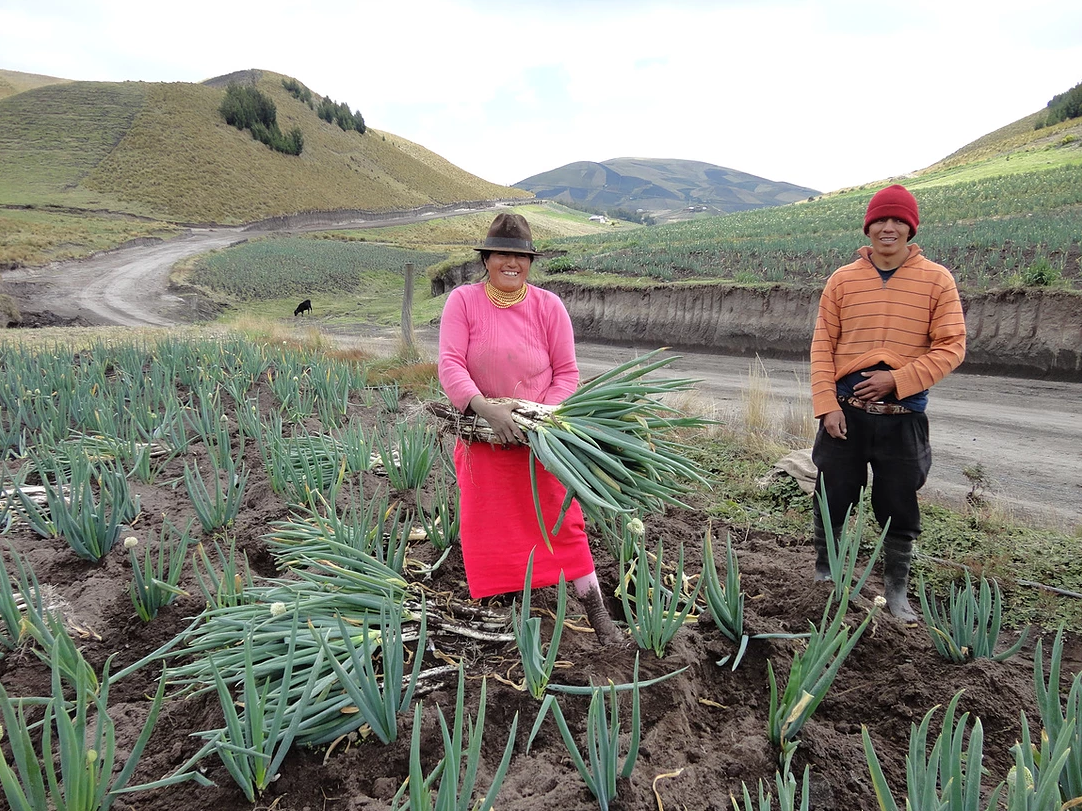 During their seven years of work, the microloan group in Romerillos received 84 trainings on topics such as animal husbandry, crop management and administration, and accounting. The result of these trainings can be observed when the members face responsibilities within the organization and in the agricultural management.
During their seven years of work, the microloan group in Romerillos received 84 trainings on topics such as animal husbandry, crop management and administration, and accounting. The result of these trainings can be observed when the members face responsibilities within the organization and in the agricultural management.
The group has also experienced increases in agricultural productivity thanks to the help of FEDICE. Since the group began, the onion harvest has increased by 215%. Originally, the land produced 59 bunches per month and now produces 189 bunches per month. The production of milk increased by 100% – going from eight liters to sixteen liters per day per animal. In relation, the production of sheep wool increased from 3 pounds per animal to 7.15 pounds.
Maca Atapulo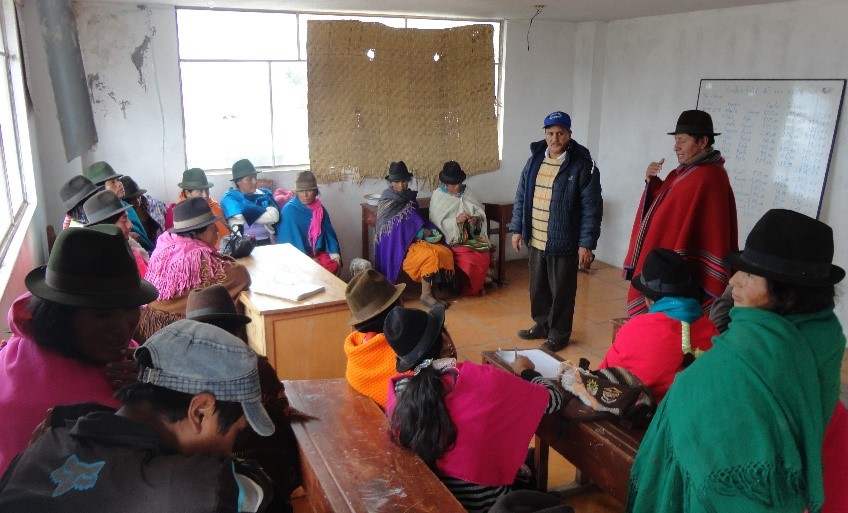 FEDICE is providing microloans and training for a community of farmers in Maca Atapulo. Maca Atapulo is an indigenous community located in Cotopaxi, Ecuador. The group receiving the loans consists of 24 women, dedicated mainly to the production of sheep, cattle, and onion.
FEDICE is providing microloans and training for a community of farmers in Maca Atapulo. Maca Atapulo is an indigenous community located in Cotopaxi, Ecuador. The group receiving the loans consists of 24 women, dedicated mainly to the production of sheep, cattle, and onion.
The objective of the work in Maca Atapulo is to improve the level of organization, economic, and technical life of the participating families. This is accomplished by taking advantage of natural resources and labor available in the community and therefore generating employment and income for each household.
Eleven families will raise sheep, seven families will raise cattle, and six families will farm onions. This farming project will create work so that families are not forced to migrate. FEDICE is glad to provide training to the group in theoretical and practical aspects of sheep breeding and other issues such as the economic management of the microloan group. The beneficiaries will continue to be trained by FEDICE in agricultural, health, accounting, and organizational matters to ensure the strengthening of the organization and livestock production. Based on knowledge and practice, FEDICE will help this community increase productivity by 10% per animal and increase family income by 20%.
Global Ministries welcomes gifts for FEDICE Priority Projects and extends thanks to all who have supported FEDICE with their prayers and generous gifts.
Update: November 2018
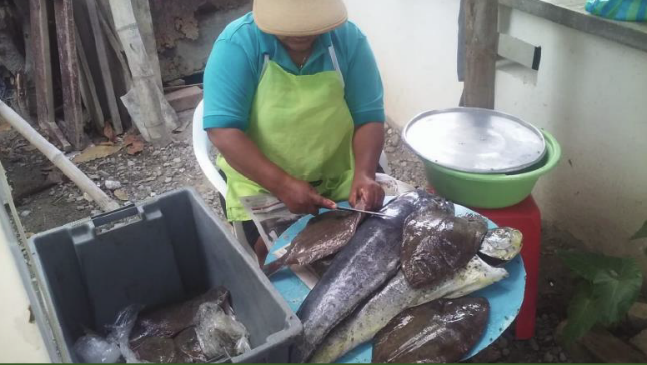
Since a magnitude 7.8 earthquake hit Ecuador’s coast on April 17, 2016, FEDICE has been working on a credit program for economic development within Sua called the New Hope of Sua. Access to financial credit allows families to support the sale of food such as coconut sweets, tamales, ceviche, and other seafood dishes, as well as the sale of household items. In addition, credit is given to invest in raising chickens for sale and developing the tourism industry.
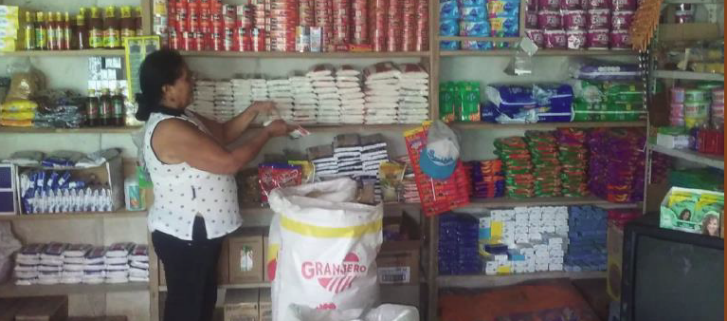
The successes of FEDICE’s credit program can be seen in the story of Jessica. For years, Jessica sought opportunities to start a business to sell notebooks and stationery, but the opportunities never materialized. After the 2016 earthquake, Jessica lost everything, yet she persisted to move forward. She heard her local church was participating in FEDICE’s New Hope of Sua microcredit program. Jessica attended the training workshop, informational sessions, and she received her first financial credit to start a business. Together, Jessica and her mother built a small room at the front of their house and began to sell notebooks, stationery, and food items. They have used the profits to expand their store and to find new items to sell.
In 2018, FEDICE worked in 17 communities with 355 families, including 1420 children. FEDICE projects support participants spiritually as well as economically. Community participants improve their quality of life and enhance their communities.
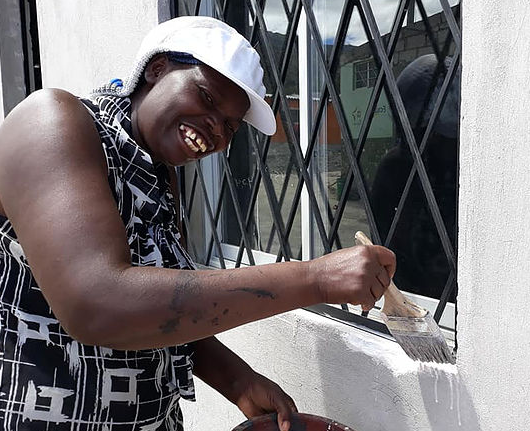 Strong participation of women is especially important in FEDICE’s projects. One woman said: FEDICE has allowed me to grow in several ways and I feel happy because I can contribute financially to my family and all this support has allowed me to give my children an education, which is a great inheritance for them. The best thing of all is that over the years I have become a woman who participates, who thinks and decides without fear because FEDICE allowed me to grow economically and above all feed my spirit in a way that makes me feel valuable to my family and my community.
Strong participation of women is especially important in FEDICE’s projects. One woman said: FEDICE has allowed me to grow in several ways and I feel happy because I can contribute financially to my family and all this support has allowed me to give my children an education, which is a great inheritance for them. The best thing of all is that over the years I have become a woman who participates, who thinks and decides without fear because FEDICE allowed me to grow economically and above all feed my spirit in a way that makes me feel valuable to my family and my community.
Another woman who benefited from working with FEDICE in 2018 was Rocio from Pusir. Rocio was living in a very cramped home with her husband and four children. FEDICE assisted Rocio to build a larger, more structurally sound home for her and her family.
Global Ministries treasures its relationship with FEDICE and welcomes gifts in support of their work.
Update: May 2019
Sua Microcredit Project
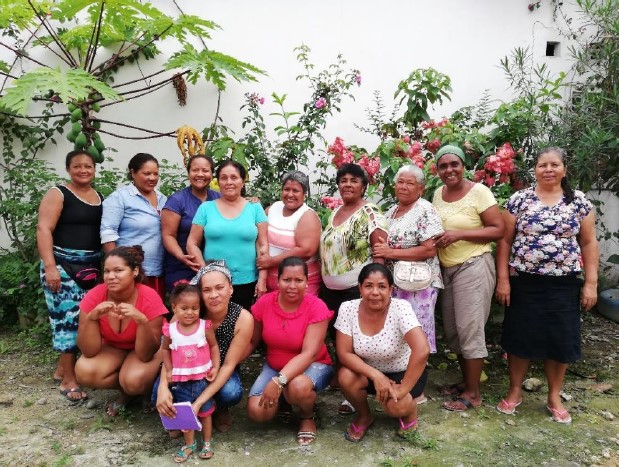 The Sua Microcredit Project grants low-interest loans and promotes unity and solidarity among participants. The project’s purpose is to offer an alternative source of financing for family businesses in place of informal loans with very high-interest rates and traditional loans with unattainable requirements.
The Sua Microcredit Project grants low-interest loans and promotes unity and solidarity among participants. The project’s purpose is to offer an alternative source of financing for family businesses in place of informal loans with very high-interest rates and traditional loans with unattainable requirements.
Currently, this program serves women from 16 families. The participating women named the group “New Hope.” The project began with $9,000 in funds and made loans of $300 per family. With the repayment of these first loans and additional funding, today women participating have access to loans of up to $1,000 that are paid back in monthly installments. New Hope participants have used the money to finance their small businesses by buying seafood, materials for handicrafts, beachwear to re-sell, as well as for equipment for preparing and selling food, and for chickens to raise and sell.
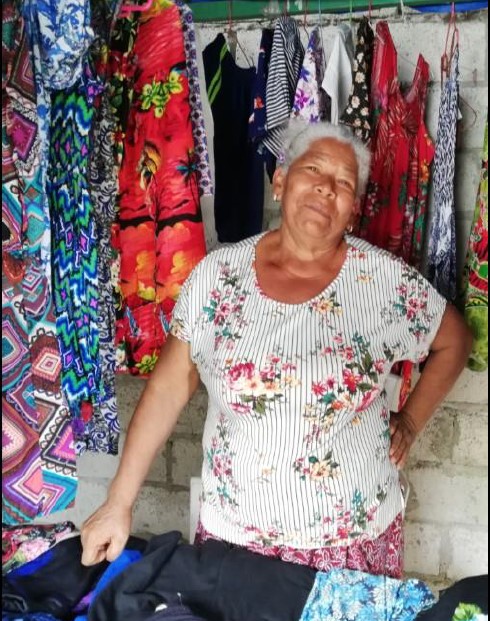 Through both successes and challenges, the Sua Microcredit Project has continued to maintain its funding base and has grown its ability to make loans to the women involved. New Hope participants find motivation through their involvement together. Their work and leadership have had a positive impact on their local community. The women who participate in this project have received training such as how to produce low-cost products for the home, and they receive and give encouragement on how to overcome fears and raise self-esteem.
Through both successes and challenges, the Sua Microcredit Project has continued to maintain its funding base and has grown its ability to make loans to the women involved. New Hope participants find motivation through their involvement together. Their work and leadership have had a positive impact on their local community. The women who participate in this project have received training such as how to produce low-cost products for the home, and they receive and give encouragement on how to overcome fears and raise self-esteem.
Read interviews with some of the women participating in the “New Hope” group.
Watch this video from 2018 about the Microcredit project
Update: August 2020
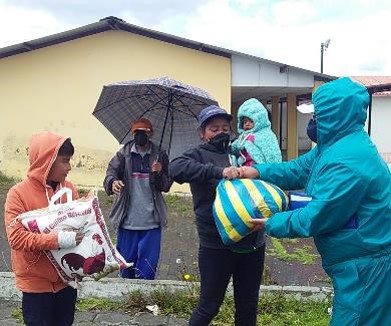 In Ecuador, the COVID-19 pandemic has made it challenging for many people to work and access items such as food. Many communities where FEDICE is present rely on livestock and crop production for their income. With local markets partially or completely closed, families in FEDICE programs have been greatly impacted. In other areas of Ecuador where FEDICE is present, their economies rely heavily on tourism which is nearly non-existent now.
In Ecuador, the COVID-19 pandemic has made it challenging for many people to work and access items such as food. Many communities where FEDICE is present rely on livestock and crop production for their income. With local markets partially or completely closed, families in FEDICE programs have been greatly impacted. In other areas of Ecuador where FEDICE is present, their economies rely heavily on tourism which is nearly non-existent now.
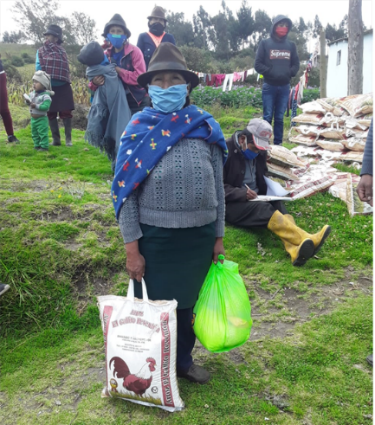 In coordination with several microcredit women’s groups, FEDICE determined that the best response would be to coordinate regular distributions of food and hygiene kits to families in communities who have been affected harshly by the pandemic. To deliver these kits, FEDICE is working with well-established groups, such as the New Hope women’s microcredit group in Sua, Ecuador. All involved have been careful to take preventative measures to keep everyone healthy and safe as best as possible. FEDICE has been communicating and encouraging communities on how to use the good hygienic practices to prevent the spread of the virus.
In coordination with several microcredit women’s groups, FEDICE determined that the best response would be to coordinate regular distributions of food and hygiene kits to families in communities who have been affected harshly by the pandemic. To deliver these kits, FEDICE is working with well-established groups, such as the New Hope women’s microcredit group in Sua, Ecuador. All involved have been careful to take preventative measures to keep everyone healthy and safe as best as possible. FEDICE has been communicating and encouraging communities on how to use the good hygienic practices to prevent the spread of the virus.
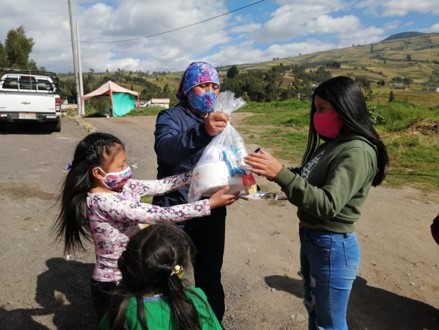 To date, FEDICE has distributed food in 19 communities to approximately 460 families, including families in the communities of San Francisco, Pupana Sur, Planchaloma, La Pradera, San Miguel, Luz De America, Cochapamba, Tucumbi Cucho, Maca Atapulo, Satna Rosa, Romerillos, and Sua. Hygiene kits have been distributed to children at seven FEDICE daycare centers in Latacunga, Huaycopungo, Tocagon, Caluqui, Pijal Alto, Huaycopungo, Pijal Centro. In total, FEDICE distributed hygiene kits for almost 300 children.
To date, FEDICE has distributed food in 19 communities to approximately 460 families, including families in the communities of San Francisco, Pupana Sur, Planchaloma, La Pradera, San Miguel, Luz De America, Cochapamba, Tucumbi Cucho, Maca Atapulo, Satna Rosa, Romerillos, and Sua. Hygiene kits have been distributed to children at seven FEDICE daycare centers in Latacunga, Huaycopungo, Tocagon, Caluqui, Pijal Alto, Huaycopungo, Pijal Centro. In total, FEDICE distributed hygiene kits for almost 300 children.
Video update from FEDICE in Ecuador
Update: July 2021
New Hope Microcredit group in Sua
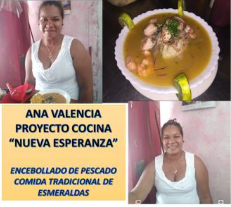
In 2021, The Ecumenical Foundation for Integral Development, Training and Education (FEDICE) has seen innovation and creativity emerge in the communities it walks alongside. In the community of Sua in the Esmeraldas province, FEDICE continues to support women’s microcredit program, New Hope. As New Hope enters their fifth year of the microcredit program, FEDICE and the women of New Hope are focused on new projects to prepare and sell foods made with ingredients indigenous to Esmeraldas. This includes tamales and grilled meat dishes, and various seafood products, which the women will prepare and sell.
Ana, pictured here with her tasty dish of shrimp stew shares, “Thank you! Even within the circumstances we are experiencing at a global level, God touched your hearts and you helped us in one way or another. We are so grateful. May God bless you.”
San Rafael
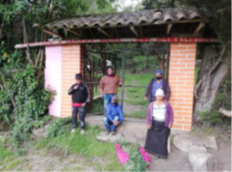
The community in San Rafael, Imbabura, Ecuador is pursuing a new project in 2021, which includes sharing local, natural treasures and tours with tourists. The Samana Sacha Community Tourism project aims to make the Forest of Rest, a local natural forest, more accessible to local and international tourists by improving transportation to the site and building needed amenities.
The Forest of Rest is located at the summit of the Puka Huayco mountain. Getting to the summit requires twenty minutes of travel by vehicle on difficult roads. Once there, travelers have no amenities, such as restrooms, access to food vendors, or lodging. The Samana Sacha board of directors plans to change that. They are constructing a cabin to provide lodging for tourists near the Forest of Rest. They also are building ovens for baking bread, restroom facilities, and even a wheelchair accessible ramp.
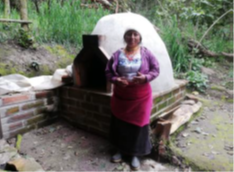
Currently, nine local families are managing the tourism project together. This is an exciting venture to allow the community in San Rafael to share one of their local treasures with the world, to welcome tourists on their own terms, and create income for their families.
Update: October 2022
The Ecumenical Foundation for Integral Development, Training and Education (FEDICE) coordinates educational, health, agriculture, and community development projects with the indigenous population in rural communities of Ecuador. With the help of Global Ministries and other partners, FEDICE carries out income-generation and construction projects, medical clinics, pastoral work, and other programs in the provinces of Imbabura and Cotopaxi. FEDICE also has been instrumental in the development of water systems and agricultural and animal husbandry programs (mostly led by indigenous women), including cultivation of garlic and onions, and raising sheep, guinea pigs, rabbits, chickens, and cows.
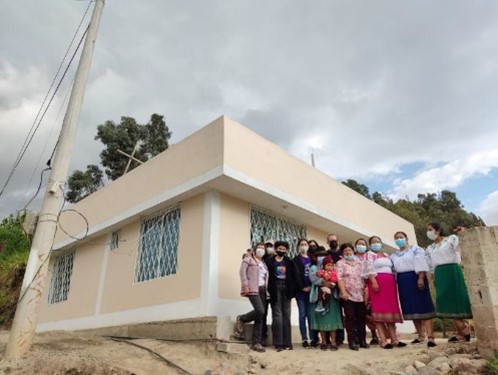
FEDICE has met the needs of the community in direct ways this year. In Otavalo, a city in Ecuador, Juanita Tocagón, her two children, and her grandson Eydan shared a 538 square foot house constructed out of cobblestone walls and a tile roof. The family of four divided up this single-room living space with curtains and boards. Today, Juanita and her family have a house built out of slab foundation and block walls that measures 775 square feet and includes three bedrooms, a living room, dining room, bathroom, and kitchen. FEDICE worked to provide adequate and sustainable housing for them.
Juanita’s previous house was equipped with artisanal facilities that put the health of the family at risk. FEDICE implemented new systems of water, electricity, and sanitation into the newly built house. Due to their improved living conditions, Juanita, her children, and her grandson Eydan will find more peace and rest at home. By meeting this basic need, this family can flourish and grow in ways that are meaningful to them.
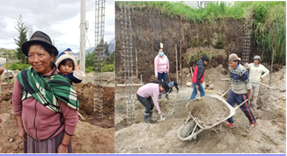
This housing project represents the positive difference that can be made with community co-partnerships. The main challenge to overcome was the cost of labor. However, thanks to the combined work of the family, local communities, and the local government, FEDICE was able to excavate the foundation and cast the concrete slab. Accomplishing this work reduced the total cost of construction. The finishing touches to come this year include installing doors inside the house and building a wall in front of the house for security, but this is not where the project ends.
After Eydan’s mother died tragically, Juanita became her grandson’s primary caregiver. In addition to constructing the house, there is a plan to monitor Eydan’s health, nutrition, and education. By supporting Eydan in this way, FEDICE continues to walk alongside the family to ensure health and growth into the future.
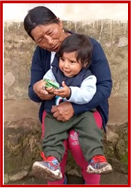
Juanita, pictured here with Eydan, shares, “Hello to all the people who are supporting me through FEDICE and other organizations. I thank you for your support sent. May God bless you. May you be very successful in helping more people like me. I see that the house was realized; I am reaching my dream where I will spend time with Eydan until God gives me life.”
Support this Ministry
To make a gift for this ministry online or by check use the online donation page.
- 100% of your gift will be directed to FEDICE Priority Projects
- You will receive updates on the work in this area as they become available
- Share in the vision of God’s abundant life for all people
Related Content
Webinar with Elena Huegel, GM Mission Co-worker in Mexico
Register now for this Global Ministries webinar with Mission Co-worker Elena Huegel on...
Read More2025 Report on Brazil Immersion
In late May 2025, ten students of the third-year cohort of Higher Education & Leadership...
Read MoreThe Peace Commission of the Evangelical Council of Colombia (CEDECOL) Condemns the Murder of Christian Leaders in Calamar, Guaviare, Colombia
en español We condemn the atrocious murder of eight Christian leaders who had previously...
Read More
